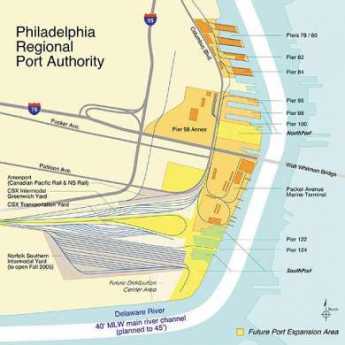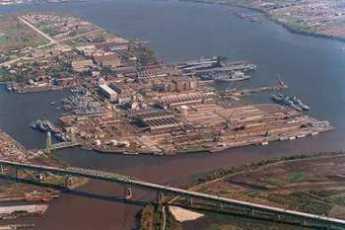Related Topics
Particular Sights to See:Center City
Taxi drivers tell tourists that Center City is a "shining city on a hill". During the Industrial Era, the city almost urbanized out to the county line, and then retreated. Right now, the urban center is surrounded by a semi-deserted ring of former factories.
City of Rivers and Rivulets
Philadelphia has always been defined by the waters that surround it.
Ownership of the Port

|
| Delaware Port |
One of my children studied for a graduate degree in Economics, and once remarked there only seemed to be one thing worth learning, namely Comparative Advantage. How's that, again, child? Free trade is good, dummy. By inference, tariffs and subsidies of local industries are a bad thing. All this talk about losing jobs to China is misguided, holds back world prosperity. If that's the case, Child, then why is the Philadelphia port run the way it is? Because Philadelphia is in a life struggle with other ports, and they all run the same way.
There are 23,000 people working in and around Philadelphia port, almost all of them paid wages that are a little surprising to hear. If you include such things as worker's compensation, the wage cost of a Philadelphia longshoreman is about fifty dollars an hour. With such a wage cost, the port cannot compete with other ports, particularly when you see how easily a shipping line can unload the ship elsewhere, with lower wage costs. The consequence is that no private company can afford to own and operate a marine cargo terminal. In our case, they are owned by the Philadelphia Regional Port Authority, which is indirectly to say they are owned by the State of Pennsylvania. The regional port authority has a $300 million annual budget, owns eight terminals, loses money, and is taxpayer subsidized. If you skip all the intermediate steps, the taxpayers of the state subsidize the port workers. In return, the rest of the state gets its Cocoa and steel shipped. What Philadelphia gets is union domination of its politics.

|
| Ship Yard |
It's easy to be too glib about all this. Billions of dollars have been invested in the transportation infrastructure and distribution organization, organized around this particular structure. Furthermore, many billions more have been invested in the industries which are based on the assumption that this distribution system will serve them. Philadelphia has the port, but a vast region depends on it and will react swiftly if changes are made too precipitously. There really does seem to be a need for the Foundations and Universities to support some useful studies about what direction the region ought to take, however slowly we move to get there. At the least, we could give some serious thought to the wisdom of going further in the direction we are going.
Finger Piers are a thing of the past and must be replaced by container cargo terminals, we are now told. Should we really spend the billions of dollars it would take to make this change? It would obviously be unprofitable for some private corporation to undertake this effort, so what can we do to make it profitable?
The natural depth of the river channel is 17 feet and needs to be dredged to 40 feet to accommodate the container ships, which we're told carry more profitable cargo than bulk carriers. We are also told this is being blocked by the New Jersey government, responding to competitive pressure from Northern New Jersey interests who want the cargo to go to Hudson River terminals. Presumably, this is a sign that New Jersey and New York are subsidizing their ports, too, and we are in a bidding war.
Thank goodness for the Constitution, which discourages shooting wars between the states.
Originally published: Friday, June 23, 2006; most-recently modified: Friday, May 31, 2019